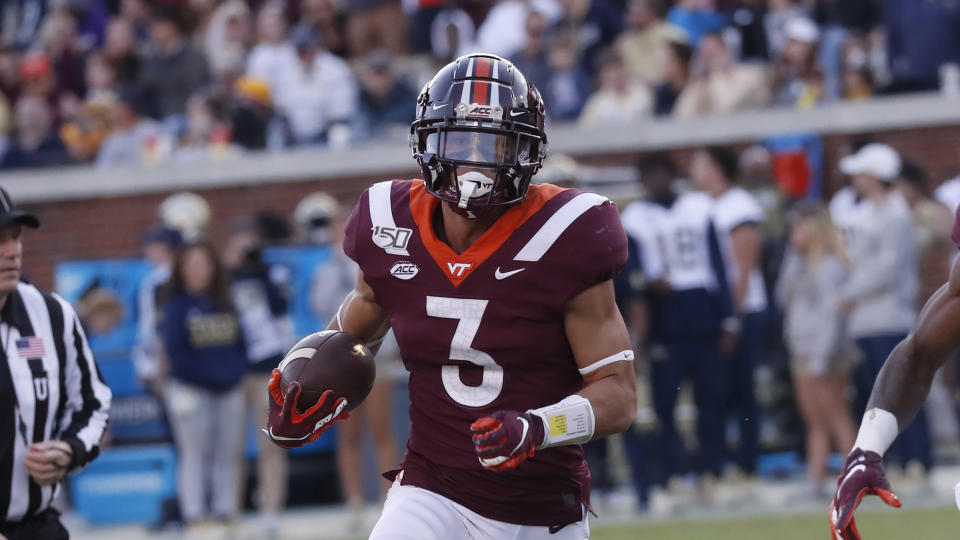Caleb Farley said Virginia Tech team workouts gave him 'deep concerns' that led to his opt out
When Caleb Farley announced he was leaving Virginia Tech to begin preparing for the NFL draft, he pointed to “uncertain health conditions and regulations” amid the ongoing coronavirus pandemic as his reasoning.
Farley, a cornerback who some are projecting as a first round pick in the 2021 NFL draft, went into more detail in a Monday guest column for NBC Sports’ Football Morning in America. It does not paint the safety precautions at Virginia Tech in a positive light.
Farley said he “started having deep concerns about staying healthy” at team workouts. At one point, he said he looked around and he and his teammates were “like 100-deep” at the indoor facility with “no masks.” He also noted that some teammates were going away and were not being tested when they arrived back on campus.
This year at Virginia Tech, at our workouts, I started having deep concerns about staying healthy. Guys were going home, going to Myrtle Beach, coming back to campus, and we weren’t getting tested. We’re all together, working out, close to each other, and you have no real idea who might have it, if anybody might have it. One day I looked around, and we were like 100-deep in our indoor facility, no masks. My concern grew more and more.
Later Monday, Virginia Tech released a statement from Dr. Mark Rogers, the athletic department’s Chief Medical Officer.
Rogers said all Virginia Tech athletes “are tested for COVID-19 and screened before being cleared to participate in any athletic activities” with the school’s follow-up testing being done “on a regular basis in accordance with CDC, ACC and NCAA recommendations.”
Additionally, Rogers said athletes and staff have been given “personal protective equipment” to wear and that the Hokies’ indoor facility utilizes “an open-air configuration.”
Rogers’ full statement is below:
Virginia Tech Athletics Statement
More ⤵️https://t.co/LXyywHLFYo#Hokies 🦃 pic.twitter.com/Qi9vWTaej6— HokieSports (@hokiesports) August 3, 2020
Farley: Opting out ‘toughest decision of my life’
Farley has also been open about losing his mother to cancer in 2018, saying in his opt-out announcement that he “cannot afford to lose another parent or loved one.” That family tragedy greatly influenced his decision not to play for the Hokies in 2020.
“My dad is so important to me. Growing old with him means so much to me, more than football. I don’t know what I would do if I contracted it and gave it to him, and he passed. I couldn’t live with that,” Farley wrote.
Farley said not playing in 2020 was “the toughest decision” of his life, but one that has ultimately brought him peace. He said Virginia Tech coach Justin Fuente initially tried to talk him out of it, but was ultimately supportive of his star cornerback.

Will other players follow Farley’s lead?
Whether other college football players will follow Farley’s lead remains to be seen. Farley wrote that he knows “a lot” of other players are mulling the possibility and “trying to build up the courage to do it.”
Yahoo Sports’ Pete Thamel explored the subject in a story last week with one industry source predicting the number of opt-outs would be in the 10 to 12 range. Quincy Avery, an acclaimed quarterback coach, guessed the figure could be closer to 35 or 40.
“I know it’s on a lot of players’ minds right now,” the industry source told Thamel. “I wouldn’t be surprised if 12 of the 20 top picks don’t play their season. That’s a lot of good players not playing. It only takes one, and other people start to follow.”
Coaches throughout the country are worried about player opt-outs, and Farley said testing could be the key to easing players’ minds.
“I just hope the testing in college football will be available and it will be frequent. Because there’s no way of knowing what you’re signing up for if there’s not a good testing program,” Farley wrote.
The ACC announced last week that it is planning to move forward with an 11-game schedule beginning the week of Sept. 7-12. The conference’s scheduling model — approved as long as “public health guidance allows” — includes 10 conference games with one non-conference game. The non-conference game will be selected by each individual school and “must be played in the home state” of the ACC member.
More from Yahoo Sports:
